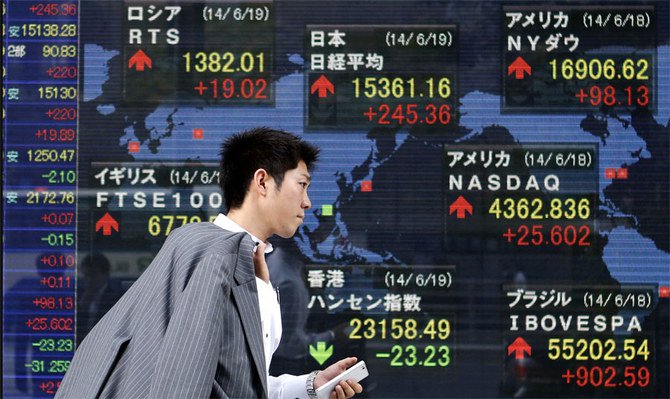
- ARAB NEWS
- 14 Jul 2025

TOKYO: The Tokyo Stock Exchange (TSE) is planning a charm offensive to persuade Saudi Aramco to list shares in Japan in the international element of its forthcoming initial public offering (IPO).
At a recent meeting in Tokyo, Hidetoshi Nagata, head of global listings at the TSE, told Arab News that there had already been “several” meetings between Japanese officials and senior executives of Aramco working on the IPO plans, and more are in the process of being arranged.
“We’ve had talks with the company several times, and now we are approaching Saudi Aramco again to explore the next meeting,” he said. Nagata said that Aramco chief executive Amin Nasser had met senior TSE officials in the past, though not recently, and there had been talks between members of the executive team working on the Aramco IPO and Japanese market officials. Aramco declined to comment.
He said that the TSE could use the opportunity of the forthcoming visit by Crown Prince Mohammed bin Salman for the enthronement ceremony of the Japanese emperor Naruhito, when senior Saudi policymakers are expected in Tokyo with the royal party. The TSE is also planning to attend the Future Investment Initiative gathering in Riyadh at the end of the month.
“It would be an advantage for the Saudi Arabian oil company to be listed on an Asian market because Saudi Aramco’s share price will be influenced by the oil price. A listing in Tokyo would mean they can get a fair price all the time in 24-hour oil trading,” Nagata said.
There are increasingly close business and financial links between the Kingdom and Japan. Around 40 percent of Japan’s crude imports come from Saudi Aramco, while manufactured goods, especially electronics and automobiles, are big items on the Saudi Arabian import schedule from Japan.
The Kingdom’s Public Investment Fund put $45bn into the first Vision Fund, launched by Japanese investor Masayoshi Son of SoftBank, who enjoys a close relationship with senior Saudi policymakers.
There has been increasing speculation in financial circles that Tokyo could be seen as the best alternative for a global listing for Aramco. New York has legal and regulatory issues, London is losing its attraction because of the political chaos surrounding Brexit, and Hong Kong — previously regarded as the Asian frontrunner — has suffered because of the protests there.
Nagata said that Tokyo enjoyed a stable and low-risk investment environment and had a large number of high net worth retail investors who would be attracted to what is expected to be a high level of dividend from Aramco.
Plans for the IPO are accelerating with meetings between investment bankers selected for the first stage of the share listing, expected to involve at least 1 percent — worth up to $20bn — of Aramco total equity floated on the Tadawul in coming weeks.
More than a dozen American and European banks have reportedly been hired to play different roles in the IPO, which could be one of the biggest in history. Reuters reported that SMBC Nikko Securities, investment banking business of the giant Sumitomo Mitsui financial group, had been selected as the first Japanese bank in the IPO process. Aramco declined to comment.
Several other Japanese financial institutions are also believed to be pitching for a role in the IPO, according to Tokyo financial institutions who ask not to be identified because they are involved in the process.
Nagata said that foreign companies had dropped off the Tokyo Stock Exchange in recent years. From a high of nearly 200 in the late 1990s, there are now only four foreign stocks listed on the exchange, mainly because the rise on Internet trading has meant foreign companies do not need a physical presence in Tokyo, he said.
“The requirements for foreign companies are the same as for Japanese companies, so it is not difficult,” he said. Foreign companies have to communicate to shareholders and the regulator in Japanese, but there are no requirements for a minimum flotation level that would be a hurdle to an Aramco listing, Nagata added.
But he made clear that Aramco would have first to list on the Tadawul before it could join the TSE. “If it is already listed, there is no minimum requirement, so there would be no problem for Aramco in Japan,” he said.
Tokyo is the third biggest stock exchange in the world, after the two exchanges — NYSE and Nasdaq — in New York. Founded in 1878, it merged with the Osaka exchange in 2013 to form the Japan Exchange Group.
Last December it staged one of the biggest IPOs ever with the $21bn listing of SoftBank’s mobile phone business.
One Dubai-based executive at a Japanese financial institution, who asked not to be identified, said: “A TSE listing would be a huge coup for a market that had been suffering an exodus of foreign firms over the past 20 years. Given Japan’s lack of natural resources, a listing would offer domestic investors a chance to own a piece of the world’s premier oil company.”
Frank Kane is an award-winning business journalist based in Dubai. Twitter: @frankkanedubai